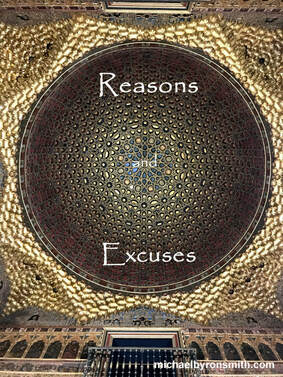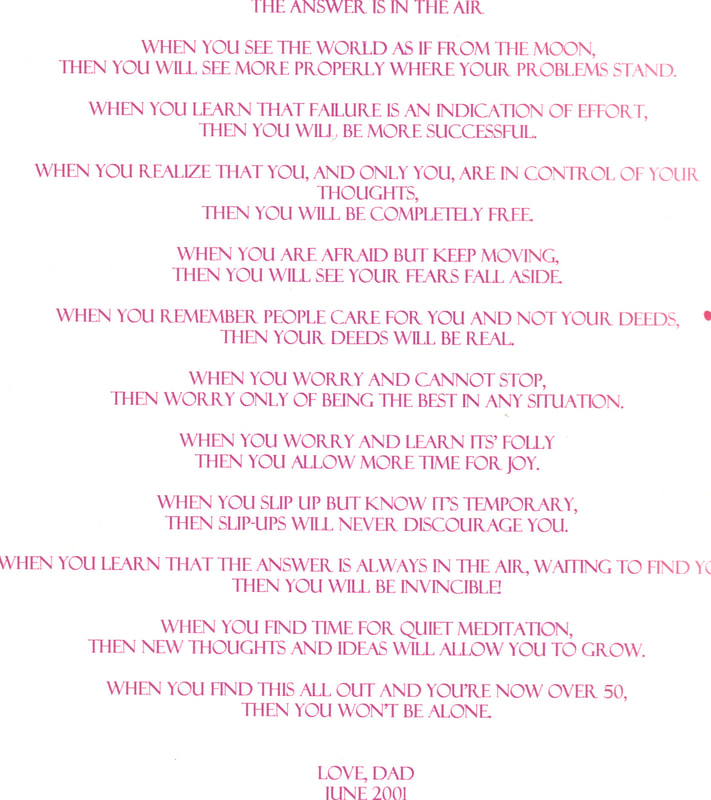 A ceiling in the Alcazar in Seville, Spain
A ceiling in the Alcazar in Seville, Spain When you do something for a reason, you have a ‘cause for action’. For example, “I went to the store because we needed bread.” A simple act. The reason is the same before and after the act.
All excuses, however, tend to be past tense even if perceived in advance. “There’s no bread because I was hungry and I ate it all.” He ate the bread for a reason, he was hungry. Still a simple act, but eating it all was a selfish action knowing others wanted bread also. His reason to eat some bread was hunger, but to eat all the bread required an excuse of hunger because he had a choice not to eat it all.
When the result of an action or non-action isn’t perceived the way you wanted it to be, due to your own selfish or non-thinking behavior, the act is not from a reason, but an excuse, because better alternatives existed. Reasons don’t typically need rationalization, excuses always do.
Now I understand this could be debated ad-nauseam, and I bring it up not to be definitive, but to cause reflection. There are reasons people do things, and often they don’t have positive results. That’s understandable! Honest failure exists and is a path to eventual success. When things go wrong due to your own selfish or non-thinking behavior, failure exists and is not a path to success. There are no reasons to plan failure, just excuses (rationalizations) for doing so.
Dysfunctional Families
This discussion leads me to the chaotic youth in which I was raised, never living more than three or four months in any home, born to a mostly absent and alcoholic father, a mother who had to work constantly in low wage jobs, and six siblings who suffered from a lack of guidance and support. The reason these things happened to me and my siblings were the decisions of our parents. There were no reasons for being poor and itinerant from the view of my parents, but there were plenty of excuses.
When brought up in circumstances similar to mine, children react in different ways. That could be seen in my own family. It wasn’t being poor that had a real impact on any of us. Being poor in America isn’t a death sentence; it’s not even all that inconvenient compared to the rest of the world. Anyone who has witnessed the suffering in parts of the Middle East or Central Africa would think our issues were trivial. Being shy and father-deprived is not an issue when you are starving, but it can become so after the basic nutrition problem is solved, even if the food wasn’t always healthy.
Poor should not be an excuse
If an American family can hang together with proper parental care while being poor, the children will be fine, maybe even better off than kids whose parents are rich but not caring or nurturing people. But you don’t see too many poor families with awesome parents. Why that is true is simple. Families are very often poor because one or both parents aren’t remarkable. Bad choices have been made. This is a broad statement not intended to claim all poor families consist of bad parents. Not at all! It’s just that a large percentage of poor families don’t have both parents engaged in good parenting and, possibly, not even living in the home. The poverty rate for married couples in 2016 was only 5.1% - but the poverty rate for single-parent families with no wife present was 13.1%, and for single-parent families with no husband present was 26.6%.
I don’t have many complaints about being poor as a kid. I never starved although I often ate mayonnaise sandwiches lacking any meat. I got an education -- as wackadoodle as it was! The fact my family was poor is because my dad didn’t take care of us even though he was capable of making good money. Yes, being poor made it necessary for us to be itinerant, causing much disruption in our lives. But the blame doesn’t lie with a lack of money since being both poor and itinerant were the result of inept parenting - an irresponsible father and an undereducated mother who was required to work her ass off just to feed us. But that wasn’t an excuse to give up on ourselves – because we had alternatives.
Reasons and Excuses
I make excuses all the time, more than I should. I make them because I had better choices and didn’t take them. And certainly we often use the word reason when we actually mean excuse without trying to be deceitful. Here I am highlighting the decisions and excuses that determine the direction of our lives. Life moves forward with decisions directed by reason and reasons. Life is held back by bad choices and excuses.
The fact my life, and those of my siblings, started with obstacles was beyond our control. But to call that fact a reason to wallow in that lifestyle forever would be inaccurate. It indeed was not a ‘call for action” to be poor. As we grew older and had alternatives, then the burden of our future was on each of us. To not take those positive alternatives and run with them would allow our circumstance to remain as it had always been. From there on, to remain poor or itinerant would only be an excuse.
Summary
We were disadvantaged in our youth - not for a reason, but for excuses. Quitting school is a decision. Not getting help for alcoholism is a decision. Having a baby in your teens is a decision. A father not supporting his family is a decision. When bad decisions are made, and you are poor as a result -- you only have excuses. There are not many real reasons for being poor in America. Most of us escaped our disadvantaged situations with reasons to escape, not excuses to remain.
















